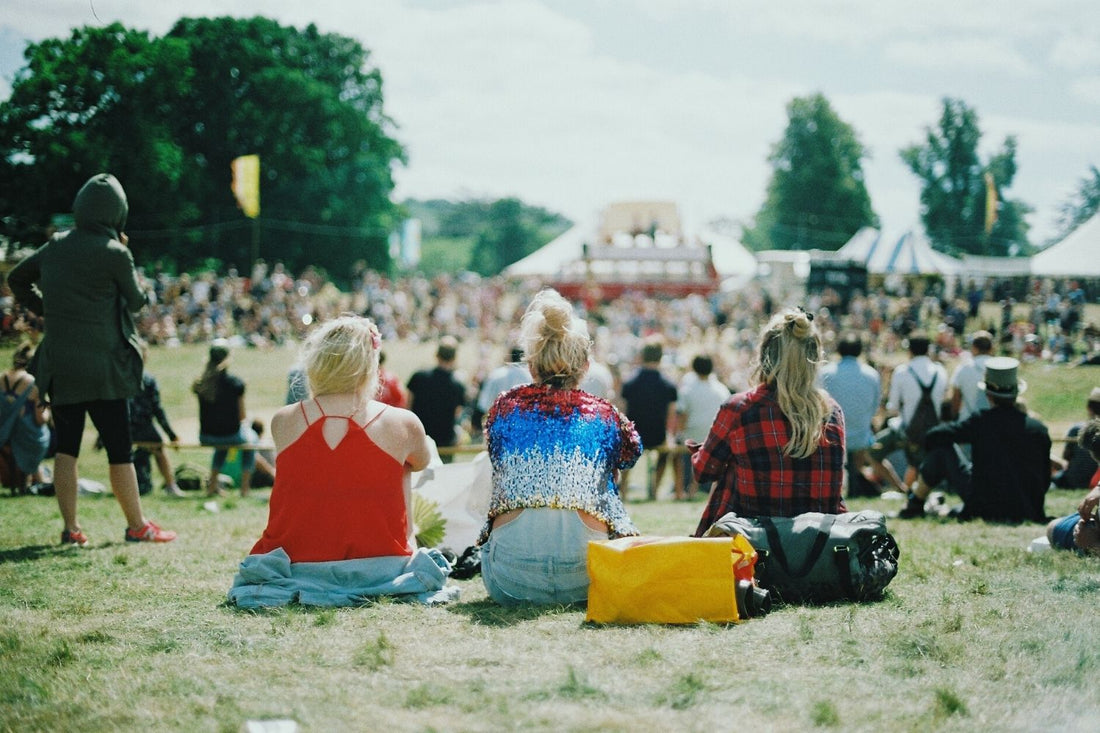
European festivals are changing the way we party

By Callum Ryan
Sir David Attenborough attending Glastonbury in the United Kingdom and Dr. Jane Goodall attending Sziget Festival in Budapest… what on earth is going on?!
2020 is the year we can confidently be a waste-conscious travellers and festivalgoers knowing that we will fit right in. If you’re one of countless travellers jet-setting to those glistening European waters this June/July, you’re more than likely aware of Europe’s world-class festivals with jaw-dropping line ups, and unprecedented crowds. 2019 saw these farm-based pop-up cities of near 200-000 people shift their focus to eco-friendly alternates as travellers enjoyed moshing, eating and drinking, and sleeping in the endless horizon of tents with a minimal environmental impact.
So why the need for change? The increasing attendance spike in the past 10 years was matched by record size aftermath and graveyards of waste. In 2017, the world’s largest Greenfield festival, Glastonbury, recorded its most astounding figures yet:
- 40 tonnes of plastic bottles
- 60 tones of paper and card
- 132 tonnes of food waste
How’s that for a line-up? They found consistent high contributors included plastic bottles, non-degradable festival glitter and wipes, easy-purchase tents and chairs for the weekend.
Despite pledging enormous efforts to composting, recycling and creating biofuels from waste, daughter of Glastonbury’s founders, Emily Eaves, has decided current efforts were simply not good enough. Her new movement “love the farm and leave no trace” encourages better organisation globally, and now instils in the mind of festivalgoers:
Our love for the planet should leave nothing but positive traces. Saying we’ll recycle is no longer a viable solution.
The result for 2019 was a complete sustainable makeover. Beginning with its pledge to take Glastonbury 100% plastic free, attendees experienced:
- 57 refill stations, both kiosks and self-service
- Water being sold only in cans
- Paper plates and wooden cutlery
Additionally, pre and post-festival operations seek to remove ALL traces and sustainably dispose or convert all waste to energy. Now we are encouraged to use old-fashioned soap and flannel, purchase or hire sturdy tents, and return it or donate, bring reusable bottles and leaving the plastic outside. However, this is simply the beginning. The real challenge is changing the mindset and pack list of attendees. Eaves preached:
“We’d love you to bear in mind this is a farm. Think about what you bring. Move away from a disposable convenient lifestyle.”
Atop, the true magic came at the wrap up of Glastonbury 2019. Guest Star, Sir David Attenborough was invited to the Pyramid stage to tease his new television series “7 Worlds, 1 Planet.” Although catching the audience in-between sets, Attenborough was not a failure in captivating and inspiring his audience:
“There was once sequence in Blue Planet 2 which everyone seems to remember. It was one in which we showed what plastic has done to the creatures that live in the ocean. It had an extraordinary effect. And now this great festival has gone plastic-free! That is more than a million bottles of water, have not been drunk by you in plastic. Thank you. Thank you.”
Attenborough was a great reminder that the waste we produce today and the amount of it has changed and banding together, we are making positive change. Secondly, post-festival, it was announced 99.3% of all tents , or donated to a local English charity – a change from 2017’s trash graveyard below, and a significant difference to the local environment.
However Attenborough and Glastonbury were not the only sustainable noisemakers of the European festival season. Sziget Festival is located on an Island in the Danube River of Budapest in Hungary. Across its 108 hectares, it hosts 1000 performances on 60 stages over 7 days for half a million ‘Szitizens.’ Catering for so many attendees’ has certainly left its eco-footprint previously, however 2019 has seen the festival giant introduce a new initiative titled ‘Green Sziget.’
The new initiative seeks to create major changes its key 5 eco-contributors from ‘Waste Production to Land Use’ Its major changes came in the form of pocket ashtrays provided to attendees, the ‘Don’t Suck’ anti-straw program and the requirement for festivalgoers to purchase a reusable cup. However the real eye opening moment for many came with the appearance of renowned environmentalist Dr. Jane Goodall. Explaining her 60 years of work and the many lessons animals have taught her about the earth, Goodall made her message clear:
“Its my greatest hope for the future. Young people, when they understand their problems and they’re empowered to take action are changing the world.”
Glastonbury and Sziget are just 2 of the fantastic examples that 2019 provided us within championing sustainable fun. 2020 is the year we can confidently be a waste-conscious travellers and festivalgoers knowing that we will fit right in. In the words of Goodall:
“We can save the world if we get together. And we will save the world if we get together. Together we can, together we will.”
So before you jet-set this summer, make sure you’ve packed your bamboo cutlery, clipped your reusable water bottle to your backpack, and pledge to make your holiday have a positive environmental impact for 2020!
About the author:

